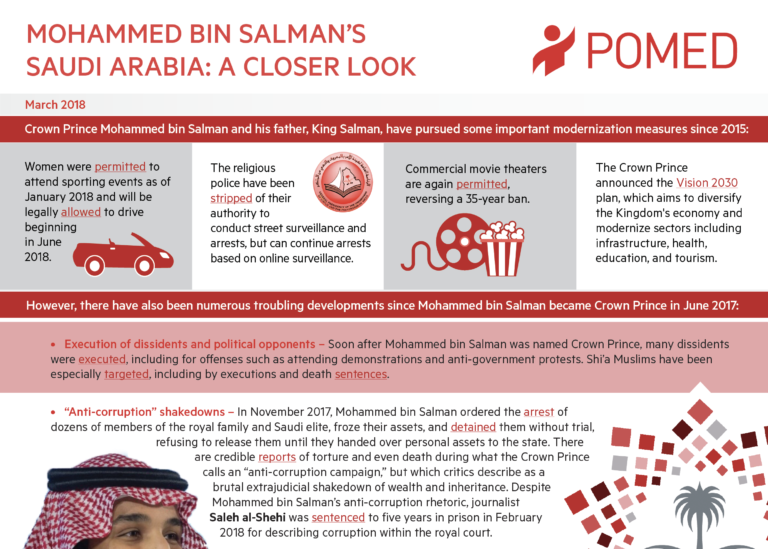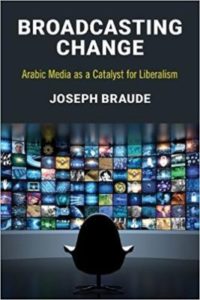
Saudi Crown Prince Mohammed bin Salman is in Washington, D.C., March 19-22, the third stop on his first foreign trip as crown prince, notes the Project on Middle East Democracy:
 Mohammed bin Salman has been heralded as a great reformer in some circles for his vision of modernizing aspects of religious, social, and economic life in the Kingdom. His efforts to loosen restrictions on Saudi women, in particular, have won wide acclaim. However, as the Washington Post editorial board noted, “The problem is that the [crown prince’s] liberalizing steps have been accompanied by even bolder acts of repression.”
Mohammed bin Salman has been heralded as a great reformer in some circles for his vision of modernizing aspects of religious, social, and economic life in the Kingdom. His efforts to loosen restrictions on Saudi women, in particular, have won wide acclaim. However, as the Washington Post editorial board noted, “The problem is that the [crown prince’s] liberalizing steps have been accompanied by even bolder acts of repression.”
What the 32-year-old crown prince, or MBS, as he is known, hopes to get out of the visit is proof for conservatives back home that the pain of reform and the discomfort of modernization is worth it,” analyst Kimberley Dozier writes for Cipher Brief.
 In an op-ed for the Washington Post, the crown prince lauded U.S.-Saudi security cooperation, including shared efforts against terrorism, including intelligence sharing and joint counterterrorism ventures such as the Global Center for Countering Extremist Ideology, or Etidal.
In an op-ed for the Washington Post, the crown prince lauded U.S.-Saudi security cooperation, including shared efforts against terrorism, including intelligence sharing and joint counterterrorism ventures such as the Global Center for Countering Extremist Ideology, or Etidal.
MbS has insisted that embracing “moderate Islam” is a prerequisite of modernization. He has promised to combat radical Islamist ideology, notably by curbing the Sahwa (Awakening) movement, the Saudi branch of the Muslim Brotherhood, telling the CBS network’s 60 Minutes program that “the Saudi schools have been invaded by members of the Muslim Brotherhood, but in the near future they will be completely eliminated.”
Now, “we have extremists who forbid mixing between the two sexes and are unable to differentiate between a man and a woman alone together and their being together in a workplace,” he said. But this ideology contradicts the “true model” of Islam, he added.
 But the challenge of curbing radical ideology was highlighted by today’s news that the Belgian government has transferred the administration of the Great Mosque in Brussels from Saudi Arabia to Morocco. The decision was based on a series of recommendations by a parliamentary committee investigating the March 2016 terror attacks which said that the Great Mosque was promoting a Salafi-Wahhabi Islam that encourages violence and extremist ideology.
But the challenge of curbing radical ideology was highlighted by today’s news that the Belgian government has transferred the administration of the Great Mosque in Brussels from Saudi Arabia to Morocco. The decision was based on a series of recommendations by a parliamentary committee investigating the March 2016 terror attacks which said that the Great Mosque was promoting a Salafi-Wahhabi Islam that encourages violence and extremist ideology.
A columnist in Financial Times, writing after MbS’s recent visit to London, may well have made the correct judgment on what the 32-year-old, soon-to-be-king of Saudi Arabia is all about when he suggested that MbS was re-branding the kingdom, rather than reforming it, The Washington Institute’s Simon Henderson writes for The Hill.
 “Saudi Arabia is a country that many liberal Americans … [and] many liberal Westerners love to hate.” says Bernard Haykel, professor of Near Eastern studies at Princeton University.
“Saudi Arabia is a country that many liberal Americans … [and] many liberal Westerners love to hate.” says Bernard Haykel, professor of Near Eastern studies at Princeton University.
“He’s a different leader from everything that has come in the last 50 years. He has a vision,” says Haykel. “People have pinned huge hopes on his ability to actually change the economy and reform society. Those hopes are very dangerous.”
The prince’s social and economic reform program, much of which is included in his “Vision 2030” agenda, seeks to modernize Saudi Arabia in a generation, notes Hussein Ibish, Senior Resident Scholar at the Arab Gulf States Institute in Washington (AGSIW):
“Shifting from an oil-based economy to a diverse one is one of his most ambitious projects, and it involves vastly increasing his country’s infrastructure, technological and, especially, human capacity, (including Saudi women),” he writes for Bloomberg. “The partnership with U.S. is central to all three pillars, which is why MbS is going to spend so much time in so many cities around the country in the coming days.”
 Near the top of the U.S. president’s priorities should also be securing the crown prince’s commitment to lead the ideological war against the scourge of violent jihadism, argues John Hannah, a senior fellow at the Foundation for Defense of Democracies. MBS’s purported willingness to “destroy” the monster of global jihadism that the kingdom helped create needs to be turned into a concrete action plan. There should be multiple elements to such an effort, but some immediate tasks come to mind, he writes for Foreign Policy:
Near the top of the U.S. president’s priorities should also be securing the crown prince’s commitment to lead the ideological war against the scourge of violent jihadism, argues John Hannah, a senior fellow at the Foundation for Defense of Democracies. MBS’s purported willingness to “destroy” the monster of global jihadism that the kingdom helped create needs to be turned into a concrete action plan. There should be multiple elements to such an effort, but some immediate tasks come to mind, he writes for Foreign Policy:
- First, school textbooks. The Saudis promised to eliminate the hate-filled passages a decade ago. Progress has slowly been made, but the job’s still not done. Mohammed bin Salman should order it finished — this year. Behind the scenes, U.S. experts should provide verification.
- Second, working with trusted partners in indigenous communities known for their religious moderation, the Saudis should conduct a thorough audit of the global network of mosques, schools, and charitable organizations that they’ve backed with an eye toward weeding out radical staff and content.
- Third, initiate a worldwide buyback of Saudi-distributed mistranslations of the Quran and other religious materials notorious for propagating extremist narratives.
 For decades, liberals in Saudi Arabia and other Arab countries have championed religious and ethnic pluralism, women’s rights and the rule of law as building blocks of security and prosperity in their societies, notes analyst Joseph Braude, author of “Broadcasting Change: Arabic Media as a Catalyst for Liberalism”. Outsiders often discounted them, seeing their influence as too modest to make a difference, and their defeat by Islamists in the elections that followed the Arab Spring of 2010-11 seemed to validate this view. A reappraisal is now in order, he writes for the Wall Street Journal:
For decades, liberals in Saudi Arabia and other Arab countries have championed religious and ethnic pluralism, women’s rights and the rule of law as building blocks of security and prosperity in their societies, notes analyst Joseph Braude, author of “Broadcasting Change: Arabic Media as a Catalyst for Liberalism”. Outsiders often discounted them, seeing their influence as too modest to make a difference, and their defeat by Islamists in the elections that followed the Arab Spring of 2010-11 seemed to validate this view. A reappraisal is now in order, he writes for the Wall Street Journal:
Arab liberals willing to partner with conservative regimes now occupy prominent spots in top media outlets in the region and reach tens of millions of viewers, listeners and readers. They are challenging Islamists through news and comedy shows. On talk shows, dramas and editorial pages, they are promoting equality for women and among sects. Through children’s programming, they are advocating critical thinking as an antidote to demagoguery. Their hope, ultimately, is to build support for changes in religious institutions, civil society and government itself.
What is Mohammed bin Salman trying to achieve with these seemingly conflictual policies? adds POMED, a grantee of the National Endowment for Democracy. Do his reforms presage further modernization measures or are they instead intended to consolidate his and his family’s grip on the Saudi state? Will the crown prince’s style of wholly top-down reform succeed? What does it mean for the future of this important country, and for the future of U.S.-Saudi relations?
 Wednesday, March 21
Wednesday, March 21
11:30 a.m. – 1:00 p.m.
A light lunch will be available at 11:15 a.m.
SEIU Headquarters and Conference Center







